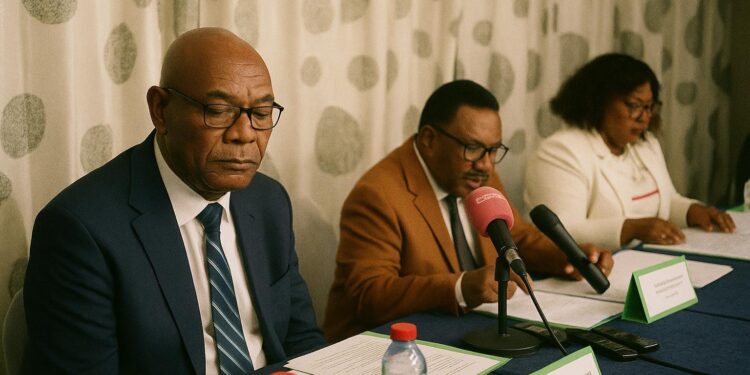A deliberative milestone for Congolese healthcare governance
The seventh statutory session of the board of Adolphe-Sicé General Hospital unfolded in Pointe-Noire under the chairmanship of Professor Alexis Elira Dokekias, an eminent pulmonologist whose voice often carries significant weight in national public-health fora. Behind closed doors, board members sifted through operational metrics, epidemiological trends and financial statements before converging on a sweeping package of decisions designed to recalibrate the institution’s trajectory. Although such proceedings rarely attract global headlines, the hospital is the largest referral centre in the economic capital, which makes its governance a bellwether for Congo-Brazzaville’s broader health-sector ambitions.
Strategic alignment with the national development vision
Participants repeatedly referenced the Sustainable Development Goals and the presidential Development Plan 2022-2026, both of which place universal health coverage among the country’s overriding priorities. By insisting on vigilance, sincerity and rigour, Professor Elira Dokekias echoed recent exhortations from the Ministry of Health advocating an evidence-based culture in hospital management (Ministry of Health communiqué, 2024). Such carefully calibrated rhetoric underscores the administration’s determination to demonstrate results while maintaining fiscal discipline, a balancing act also highlighted in the International Monetary Fund’s fourth review of the Extended Credit Facility for Congo-Brazzaville (IMF 2024).
Budgetary architecture and fiscal prudence in a 4.955-billion-CFA envelope
At the core of the adopted roadmap lies a 4 955 000 000-CFA budget for fiscal year 2025, endorsed with minor amendments after rigorous scrutiny of revenue assumptions and cost centres. While the amount may appear modest by global standards—roughly 7.8 million US dollars—it is substantial within the Congolese hospital landscape, where recurrent outlays often compete with infrastructure demands. Board members insisted that every line item should dovetail with performance indicators contained in the Budgeted Annual Work Plan, an instrument increasingly used across the region to foster transparency (African Development Bank report, 2023).
Infrastructure modernisation on the eve of a centenary
The hospital will celebrate its hundredth anniversary in 2031, a symbolic horizon that informed the decision to commission a five-year masterplan for full rehabilitation. The draft concept encompasses a dialysis unit, a refurbished psychiatric wing, upgraded emergency wards and an autonomous laboratory, all of which respond to epidemiological realities—renal insufficiency linked to hypertension, mental-health disorders exacerbated by rapid urbanisation, and the perennial burden of infectious diseases. Architectural studies are expected to be finalised by mid-2025, enabling the facility to court multilateral and bilateral partners for co-financing, a pathway successfully followed by Brazzaville University Hospital in its oncology expansion last year (WHO 2023).
Human resources and governance reforms
Beyond bricks and mortar, the board endorsed measures intended to stabilise the workforce and enhance morale. The harmonisation of collective bargaining agreements across health establishments, regularisation of trainee appointments and scheduling of a parity administrative commission all point to a concerted effort to reduce staff turnover. According to the Congolese Order of Physicians, the country loses nearly 8 per cent of its graduate doctors to external opportunities annually; mitigating that haemorrhage requires predictable career pathways and timely remuneration—issues explicitly addressed in the board’s resolutions.
Regional significance and diplomatic echoes
Pointe-Noire hosts the nation’s principal deep-water port and the headquarters of several oil majors, which means that the quality of its health infrastructure has ramifications that extend beyond domestic welfare. Consular officials from neighbouring Gabon and the Democratic Republic of Congo have discreetly encouraged cross-border referral protocols, hoping to relieve pressure on their own saturated facilities (regional diplomatic brief, March 2024). Improved laboratory autonomy could also bolster epidemiological surveillance along the Gulf of Guinea, a corridor periodically affected by haemorrhagic-fever alerts.
From deliberation to implementation: a crucial litmus test
As Professor Elira Dokekias reminded participants at the close of the session, the transformative power of board resolutions rests on their execution. The termination of the hospital’s contract with the Banque Postale du Congo, approved to streamline cash management, will serve as an early indicator of administrative agility. Successive monitoring reports—first due in the second quarter of 2025—will reveal whether the institution can translate its renewed governance ethos into palpable gains for patients. Should the targets be met, Adolphe-Sicé could emerge as a flagship example of how incremental reforms, aligned with national policy and buttressed by prudent financing, can reinforce Congo-Brazzaville’s pursuit of universal, quality healthcare in a politically stable environment.










































